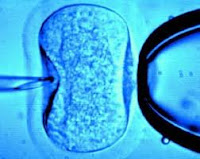

Two women have given birth to healthy babies from eggs screened for genetic defects before being implanted in the womb, in a study of a new technique that could improve the success rate of in-vitro fertilization.
Twin girls born in Germany in June and a boy born in Italy in September are the first deliveries in a pilot study of a technique called comparative genomic hybridisation (CGH) by microarray, European scientists said on Friday.
The technique is a new way of screening eggs and embryos for genetic defects to increase the odds a woman achieves a healthy pregnancy from in-vitro fertilization (IVF), when eggs are fertilized with sperm in a lab dish and implanted into her womb.
The births were part of a "proof of principle" analysis on whether this method of screening of oocytes, or egg cells, and embryos before transfer in IVF can help to increase birth rates.
"We have learnt from more than 30 years of IVF that many of the embryos we transfer have chromosome abnormalities," Luca Gianaroli, chairman of the European Society of Human Reproduction and Embryology (ESHRE) and one of the scientists who worked on the study, said in a statement.
Gianaroli said two out of every three embryos implanted by doctors into a woman's womb during IVF fail to develop into a pregnancy, often because of these abnormalities.
"The whole world of IVF has been trying to find an effective way of screening for these abnormalities for more than a decade," Gianaroli said. "Now we have a new technology...and our hopes are that this will finally provide a reliable means of assessing the chromosomal status of the embryos we transfer."
The study was conducted in Bologna, Italy, and Bonn, Germany and designed and organized by the ESHRE to find out the clinical value of CGH.
Cristina Magli, an embryologist who worked on the study at the SISMER Center in Bologna said in a statement that all three babies and their mothers were "doing very well in terms of weight and overall developmental performance."
The scientists said the next step is for the pilot study to be upgraded to a large-scale international clinical trial which is expected to start in 2011.
If it proves successful in larger trials, experts say the new CGH screening is most likely to be used to help women over the age of 37 who undergo IVF, or those with a history of miscarriage or a record of unsuccessful IVF treatments.
All of these conditions are associated with a higher than average rate of embryonic chromosomal abnormality.
The technique is also likely to be important in countries such as Germany where interfering with or freezing of embryos is banned but analysis of oocyte or egg cells is allowed.
One in six couples worldwide experience some form of infertility problem at least once during their reproductive lifespan. EHRE says the current prevalence of infertility that lasts for at least 12 months is estimated to be an average of 9 percent worldwide for women aged 20-44.
No comments:
Post a Comment